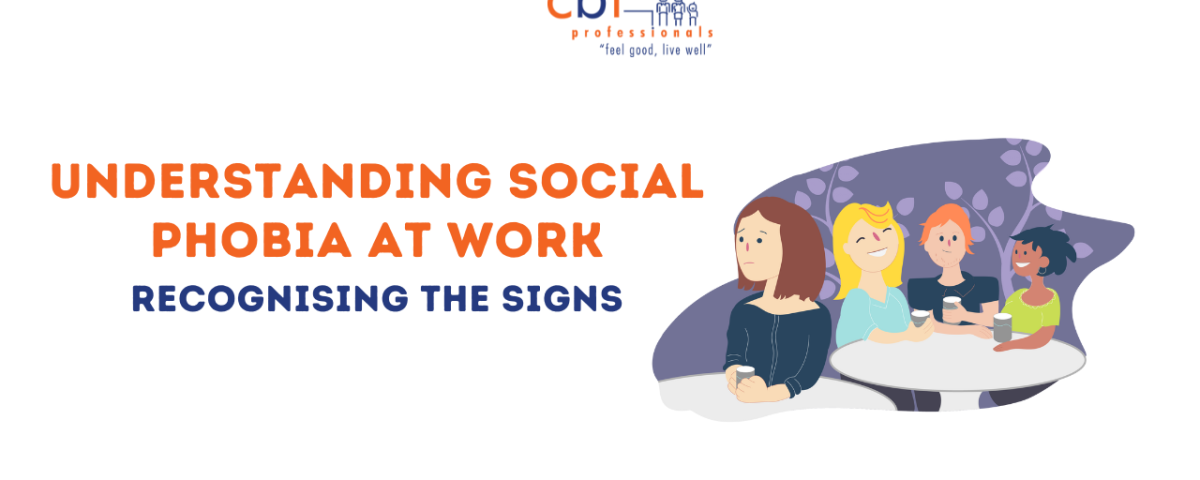Understanding Social Phobia at Work: Recognising the Signs
Social phobia, also known as social anxiety disorder, is a debilitating psychological condition that affects millions of individuals worldwide. While it can manifest in various aspects of life, its impact in the workplace can be particularly profound. In this blog, we will delve into the intricacies of social phobia, explore its symptoms, and shed light on how it can manifest in a work environment. By understanding the signs, you can better identify this condition and comprehend its impact on daily functioning.
What is Social Phobia?
Social phobia is characterised by an overwhelming fear of social situations where individuals feel exposed to scrutiny or judgment by others. It transcends mere shyness and can significantly impair an individual’s ability to function in social settings, including the workplace.
The fear is often irrational and disproportionate to the actual threat posed by the situation.
Symptoms of Social Phobia
Physical Symptoms
Individuals with social phobia may experience physical symptoms such as sweating, trembling, rapid heartbeat, nausea, and dizziness when confronted with social situations. These physiological responses are the body’s natural reaction to perceived threats, heightening the individual’s sense of discomfort and anxiety.
Cognitive Symptoms
Social phobia can manifest in cognitive symptoms such as excessive worry, negative self-talk, and catastrophising thoughts. Individuals may ruminate over past social encounters or anticipate future ones, leading to a cycle of anxiety and avoidance.
Behavioural Symptoms
Avoidance is a hallmark behavioural symptom of social phobia. Individuals may go to great lengths to evade social situations that trigger their anxiety, such as avoiding meetings, presentations, or networking events at work. This avoidance behaviour can hinder career progression and limit opportunities for professional growth.
Manifestation of Social Phobia in the Workplace
Difficulty Speaking Up
Individuals with social phobia may struggle to voice their opinions or participate in group discussions at work. The fear of being judged or criticised by colleagues can lead to self-imposed silence, causing them to fade into the background during meetings or brainstorming sessions.
Avoidance of Social Interactions
Workplaces are inherently social environments, requiring interaction with colleagues, supervisors, and clients. However, individuals with social phobia may avoid these interactions whenever possible, opting to stay secluded in their workspace or limiting communication to email and other digital channels.
Performance Anxiety
The pressure to perform well in front of others can exacerbate social phobia symptoms. Individuals may experience heightened anxiety before presentations, interviews, or performance evaluations, impairing their ability to showcase their skills and talents effectively.
Isolation and Loneliness
Social phobia can contribute to feelings of isolation and loneliness in the workplace. Despite being surrounded by colleagues, individuals may struggle to form meaningful connections or cultivate professional relationships, further exacerbating their sense of alienation.
Impaired Career Progression
The avoidance behaviour associated with social phobia can impede career progression. Individuals may refrain from pursuing promotions or new opportunities that involve increased social interaction, fearing the scrutiny and judgment of others.
Impact on Daily Functioning
The impact of social phobia on daily functioning extends beyond the workplace and can affect various aspects of an individual’s life. Some common areas of impairment include:
Interpersonal Relationships
Social phobia can strain interpersonal relationships both in and outside of the workplace. Difficulty forming connections or maintaining friendships may lead to feelings of loneliness and isolation.
Physical Health
Chronic stress and anxiety associated with social phobia can take a toll on physical health, contributing to issues such as insomnia, digestive problems, and cardiovascular issues.
Quality of Life
The pervasive nature of social phobia can significantly diminish overall quality of life, limiting opportunities for personal and professional growth and hindering the pursuit of fulfilling experiences and goals.
Understanding social phobia and its manifestation in the workplace is essential for creating a supportive and inclusive environment where individuals feel empowered to seek help and support.
By recognising the signs of social phobia and acknowledging its impact on daily functioning, employers and colleagues can play a crucial role in promoting mental health awareness and fostering a culture of acceptance and understanding. With proper intervention and support, individuals with social phobia can overcome their fears and thrive in the workplace.
Social phobia can be a complex psychological condition that can profoundly impact individuals in the workplace. However, with the right help and recognising the signs and understanding its implications, we can all work towards creating a more empathetic and accommodating work environment. CBT Professionals can help everyone feel valued and supported, regardless of if it is you dealing with social phobia or if you are wanting to support someone.
Reach out today, we can be beside you as you take the first step to recovery:
Coomera – (07) 5551 0251
Nerang – (07) 5668 3490
Mount Gravatt – (07) 3102 1366
If you, or someone you know, require help, please reach out to organisations like Beyond Blue.
Additionally reach out to these organisations that may be able to help.
- ReachOut (youth mental health service) — online help
- SANE Australia — call 1800 187 263
- Mental Illness Fellowship of Australia (MIFA) — call 1800 985 944
- LifeLine 13 11 14 — for anyone in crisis
(Health Direct, 2020).
If this is an emergency, please contact 000 or visit your local emergency department.
THUMBNAIL CARTOON
https://www.smashingmagazine.com/2017/10/confessions-impostor-syndrome/
THREE CONVENIENT LOCATIONS
MOUNT GRAVATT
Mt Gravatt Medical PrecinctSE 105, 1808 Logan Rd
Upper Mount Gravatt QLD 4122


